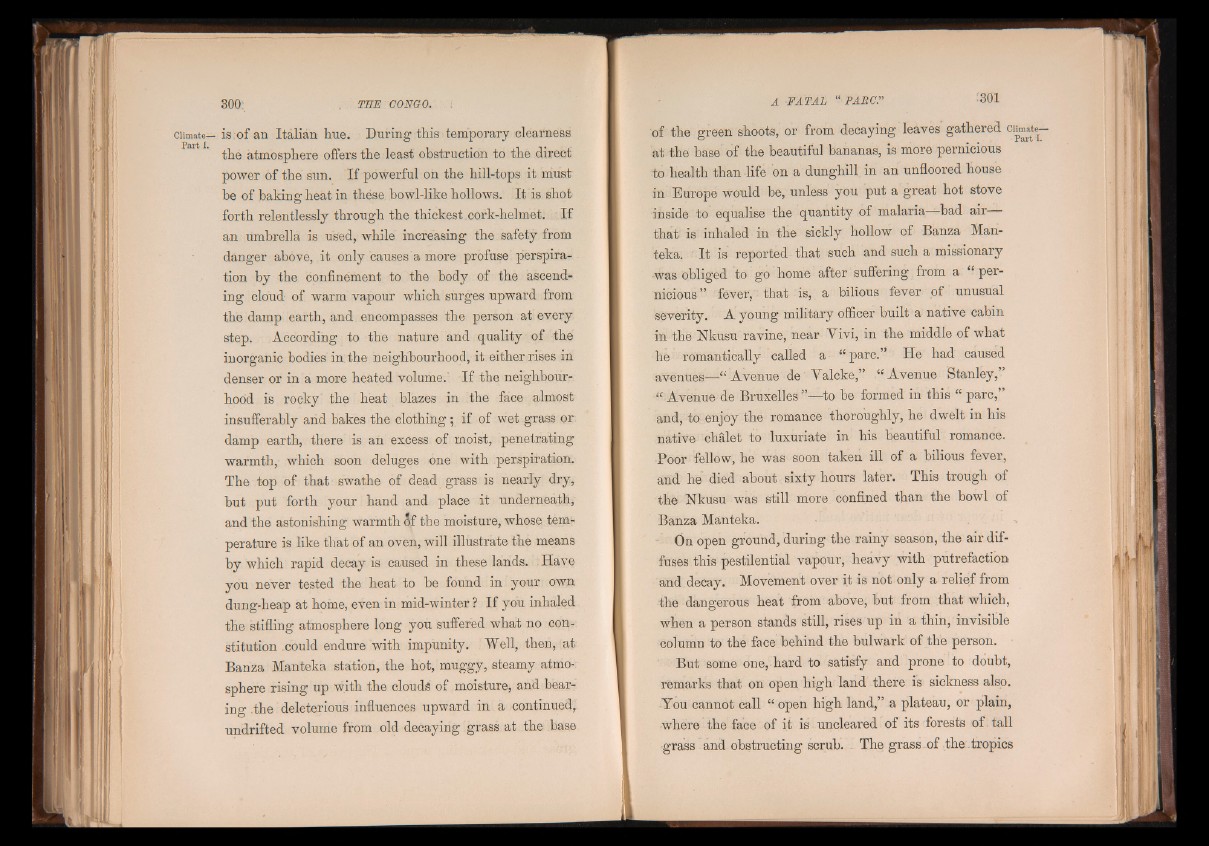
is of an Italian hue. During this temporary clearness
the atmosphere offers the least obstruction to the direct
power of the sun. If powerful on the hill-tops it must
be of baking heat in thèse bowl-like hollows. It is shot
forth relentlessly through the thickest cork-helmet. If
an umbrella is used, while increasing the safety from
danger above, it only causes a more profuse perspiration
by the confinement to the body of the ascending
cloud of warm vapour which surges upward from
the damp earth, and encompasses the person at every
step. According to the nature and quality of the
inorganic bodies in the neighbourhood, it either rises in
denser or in a more heated volume. If the neighbourhood
is rocky the heat blazes in the face almost
insufferably and bakes the clothing ; if of wet grass or
damp earth, there is an excess of moist, penetrating
warmth, which soon deluges one with perspiration.
The top of that swathe of dead grass is nearly dry,
but put forth your hand and place it underneath,
and the astonishing warmth 6f the moisture, whose temperature
is like that of an oven, will illustrate the means
by which rapid decay is caused in these lands. Have
you never tested the heat to be found in your own
dung-heap at home, even in mid-winter ? If you inhaled
the stifling atmosphere long you suffered what no constitution
could endure with impunity. Well, then, at
Banza Manteka station, the hot, muggy, steamy atmosphere
rising up with the clouds of moisture, and bearing
the deleterious influences upward in a continued,
undrifted volume from old decaying grass at the base
of the green shoots, or from decaying leaves gathered Climate—
at the base of the beautiful bananas, is more pernicious
to health than life on a dunghill in an unfloored house
in Europe would be, unless you put a great hot stove
inside to equalise the quantity of malaria bad air
that is inhaled in the sickly hollow of Banza Manteka.
' It is reported that such and such a missionary
was obliged to go home after suffering from a “ pernicious”
fever, that is, a bilious fever of unusual
severity. A young military officer built a native cabin
in the Nkusu ravine, near Yivi, in the middle of what
he romantically called a “ pare.” He had caused
a v e n u e s— “ Avenue d e ' Yalcke,” “ Avenue Stanley,”
“ Avenue de Bruxelles”—to be formed in this “ pare,”
and, to enjoy the romance thoroughly, he dwelt in his
native chalet to luxuriate in his beautiful romance.
Poor fellow, he was soon taken ill of a bilious fever,
and he died about sixty hours later. This trough of
the Nkusu was still more confined than the bowl of
Banza Manteka.
On open ground, during the rainy season, the air diffuses
this pestilential vapour, heavy with putrefaction
and decay. Movement over it is not only a relief from
the dangerous heat from above, but from that which,
when a person stands still, rises up in a thin, invisible
column to the face behind the bulwark of the person.
But some one, hard to satisfy and prone to doubt,
remarks that on open high land there is sickness also.
You cannot call “ open high land,” a plateau, or plain,
where the face of if is uncleared of its forests of . tall
grass and obstructing scrub. - The grass , of the . tropics